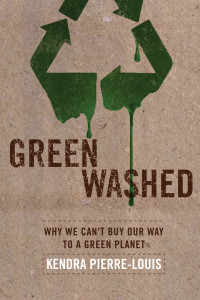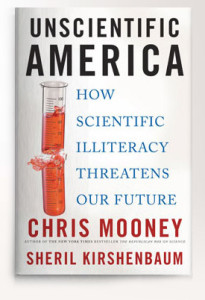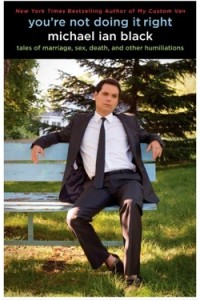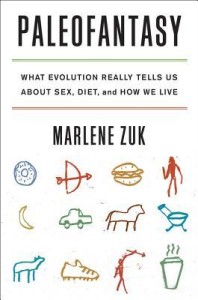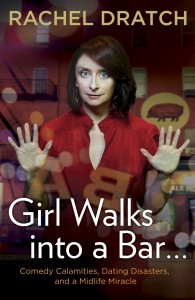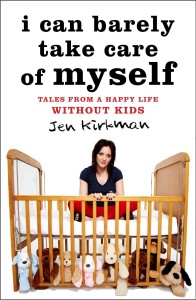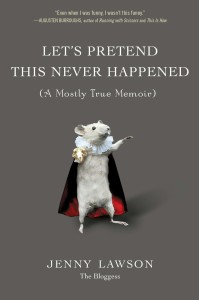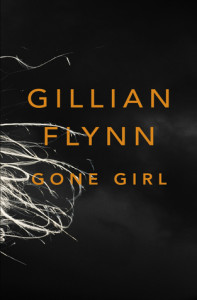Green Washed
Written by Ashley Kelmore, Posted in Reviews
This is another book I picked up at Powell’s knowing nothing about it because it looked interesting. Lucky for me, this one was both a quick read (even at 200 pages with many references to scientific studies) and well-organized. I feared it would make me feel a bit hopeless and pessimistic, especially given the way the author chose to approach the topic (more below), but in the end it left me feeling like I did have the tools to make a positive difference in my impact on the environment.
The basic premise of Ms. Pierre-Louis’s book is that saving and protecting our environment isn’t a matter of plastic water bottles vs. reusable water bottles; it’s about drinking from the tap in a glass. Explored through a series of “you thought that was good but here’s why it isn’t” example, the first half of the book focuses on the sort of false dichotomies that we have set up for ourselves (often with good intentions) to make ourselves feel like we’re making good choices for ourselves AND the planet.
This first half focuses on fashion, food choices (although not the choice to eat or not eat animal products, which is a glaring omission), cleaning products, cars, water, and buildings. The water chapter is especially fascinating, as she starts out telling the story of a group of people native to Brazil, which I assumed would be used to frame why plastic water bottles are bad. Instead, the purpose of their story is to point out how the process of creating those reusable aluminum water bottles is destroying their environment. Whoops.
The car chapter is especially interesting, as the author points out that the biggest problems with cars aren’t their fuel economy – the biggest problems are the energy that goes into making them and the energy that goes into laying roads for people to drive on. There isn’t enough time spent here on the realities that so many people cannot give up their cars due to being forced to live far from where they work in areas without public transportation; the author gives off the impression that the choice is either car or public transit but doesn’t spend a lot of time on the fact that public transit isn’t an option for a whole lot of people. I don’t think that was an intentional omission; I think it’s just not a topic she chose to spend much time on, and I do think the chapter suffers a bit for that.
After a (mostly) thorough discussion of the problems of these false dichotomies of green vs. not green (because the green version is often just as bad or nearly as bad, just in different ways), Ms. Pierre-Louis moves to a discussion of fuel. She properly eviscerates the absurd “clean coal” concept before taking on biofuel – questionable at best given the fact that a shift from food-producing crops to fuel-producing crops both hurts world food supplies AND is often quite inefficient – and other energy alternatives. It’s an interesting look, and while I am not an expert in environmental writing, she does provide what appears to be independent support for her observations.
Finally, she spends the last quarter of the book focusing on how she suggests we address this problem. The basic conclusion is that we shouldn’t be focusing our economy on GROWTH, because that requires us to produce more and consume more every year. Instead, she spends a lot of time on the ‘steady state economy’ concept – something I’ll definitely be researching. For her (and clearly many others), the economy should be in support of the environment – the environment should not just be another component of the economy. As the author points out “We’ve become so focused on the economic system that we’ve forgotten that it’s dependent on the planet.”
I liked this book, but it does have some issues. In the last, seemingly tacked-on chapter, she looks to a ‘happiness index’ instead of GDP as a measure of a nation. In theory this is an awesome idea, but my inital look at the current state of Gross National Happiness makes me extremely wary that it can be easily manipulated to support one view of what is a ‘good life’ over another. I realize that the author was likely forced to make a choice about what to focus on, but I think that given her strong talent for writing, she could have added another fifty pages, really focused on these proposed solutions, and still had a book that people could easily read and process. In spite of that I do recommend it, especially for the first 180 pages.
